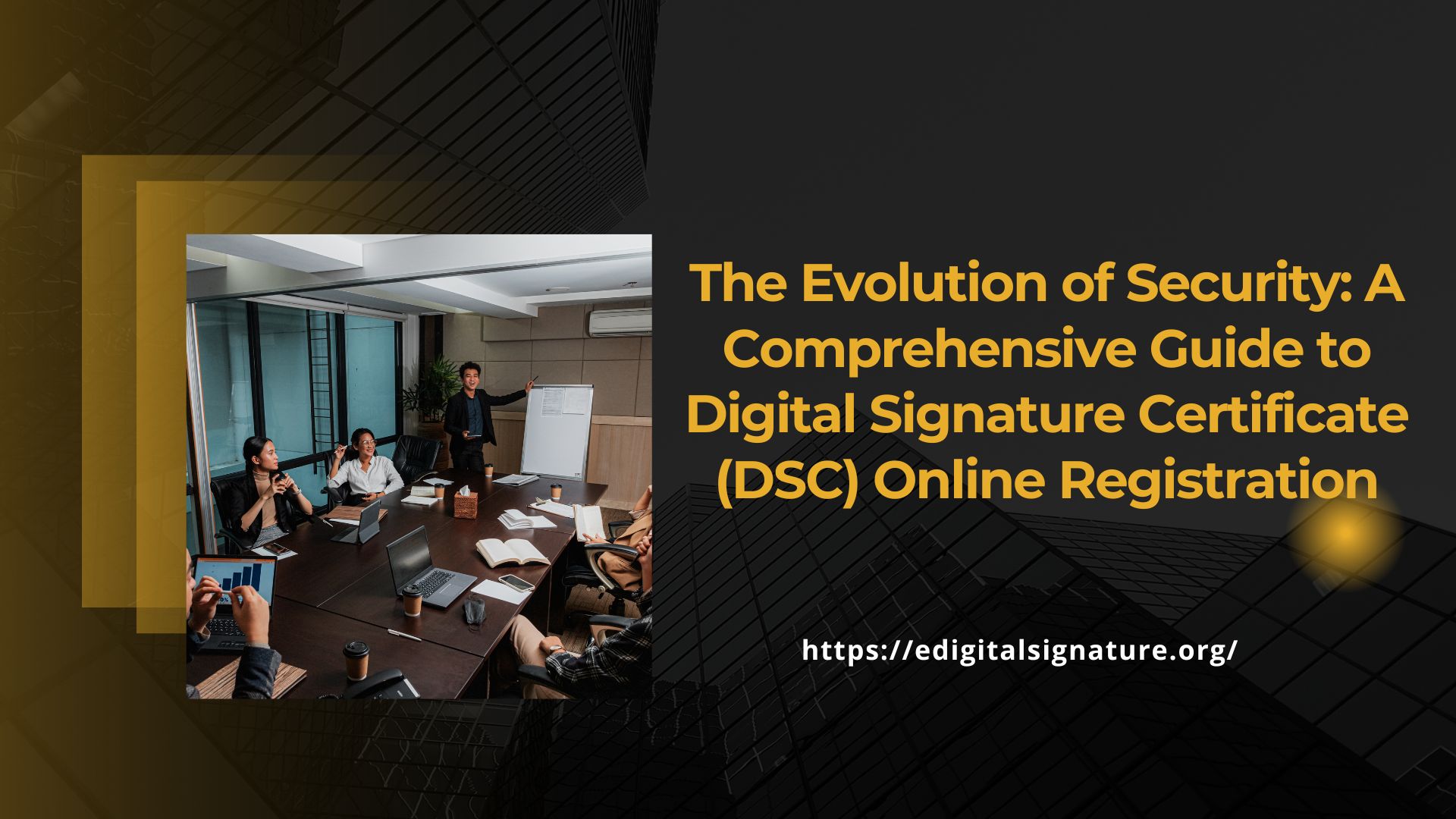Introduction:
In the rapidly evolving digital landscape, where online transactions and communication have become the norm, ensuring the authenticity and security of digital documents has become paramount. One of the most effective tools for this purpose is the Digital Signature Certificate (DSC). This article delves into the significance of DSCs, their types, and provides a step-by-step guide for online registration, empowering you with the knowledge to navigate the world of digital signatures confidently.
The Significance of Digital Signature Certificates:
A Digital Signature Certificate (DSC) is an electronic authentication mechanism used to sign digital documents, ensuring their integrity, authenticity, and non-repudiation. It functions as the digital counterpart of a physical signature, providing a level of security and trust that is crucial in the digital era. DSCs are utilized in various sectors, including government, finance, e-commerce, legal, and more, to authenticate users and secure digital transactions.
Types of Digital Signature Certificates:
There are three types of DSCs, each serving a distinct purpose:
Class 1 DSC:
Primarily used for email communication and basic online verification, Class 1 DSCs establish the user’s identity based on their email address.
Class 2 DSC:
Offering a higher level of security, Class 2 DSCs are utilized for online transactions, e-filing with government agencies, and more. To obtain a Class 2 DSC, the applicant’s identity is verified against a trusted database.
Class 3 DSC:
The most secure form of digital signature, Class 3 DSCs are used in highly sensitive transactions, such as e-tendering and e-auctions. They require the applicant’s physical presence and biometric verification.
Step-by-Step Guide to DSC Online Registration:
Follow these steps to register for a Digital Signature Certificate online:
Step 1: Choose a Certified Authority:
Select a Certified Authority (CA) that is authorized to issue DSCs. Popular CAs include eMudhra, Sify, and Capricorn.
Step 2: Choose the Type of DSC:
Determine the appropriate class of DSC based on your intended use. For basic online transactions, a Class 2 DSC is usually sufficient.
Step 3: Gather Required Documents:
Prepare the necessary documents for identity and address verification, such as PAN card, Aadhaar card, and proof of address.
Step 4: Online Application:
Visit the CA’s website and fill out the online application form. Provide accurate details and upload the required documents.
Step 5: Verification Process:
Upon submitting the application, the CA will initiate the verification process. This might involve video verification, where you showcase your documents and verify your identity.
Step 6: Payment:
Pay the DSC issuance fee online. The fee varies based on the type and validity period of the DSC.
Step 7: DSC Generation:
After successful verification and payment, the CA will generate your DSC. You will receive an email with the DSC file and installation instructions.
Step 8: Installation:
Download and install the DSC on your computer or device as per the provided instructions.
Step 9: Usage:
Once installed, you can use your DSC to sign digital documents, transactions, and communications securely.
The Advantages of Digital Signature Certificates:
Enhanced Security:
DSCs utilize cryptographic technology to create a unique digital signature for each document, making it virtually impossible to tamper with the content without detection.
Non-Repudiation:
With a DSC, the signer cannot deny their involvement in the transaction or document since their digital signature is uniquely linked to them.
Cost and Time Savings:
Traditional paper-based signing and mailing processes are time-consuming and expensive. DSCs expedite the signing process and eliminate the need for physical presence.
Environmentally Friendly:
DSCs contribute to reducing paper usage, promoting eco-friendliness in digital transactions.
Global Acceptance:
DSCs are legally recognized in many countries, making them suitable for cross-border transactions and communications.
Common Myths and Clarifications:
Myth: DSCs are only for businesses. Clarification: DSCs are available for individuals as well and can be used for various purposes, including e-filing of taxes and signing official documents.
Myth: DSCs are complex to obtain and use. Clarification: While the technology behind DSCs is complex, the process of obtaining and using them has become streamlined and user-friendly.
Myth: DSCs are not legally binding. Clarification: DSCs are legally binding and carry the same weight as physical signatures, thanks to electronic signature laws enacted by many countries.
Best Practices for DSC Usage:
Secure Storage: Store your DSC securely on a password-protected USB token or hardware device to prevent unauthorized access.
Regular Renewal: DSCs have an expiration date. Ensure timely renewal to avoid disruptions in your digital transactions.
Password Protection: Set strong passwords for your DSC and update them periodically.
Backup: Maintain backups of your DSC in a secure location to avoid data loss.
Revocation: If your DSC is compromised or lost, promptly inform the issuing CA to revoke it and issue a new one.
Future Trends and Developments:
Blockchain Integration: DSCs integrated with blockchain technology could provide an even more secure and tamper-proof signing mechanism.
Mobile DSCs: The development of mobile-based DSCs could make digital signatures even more accessible and convenient.
Biometric Authentication: Enhanced security measures could involve biometric authentication for DSC usage, ensuring the signer’s physical presence.
Suggested Read: Online Digital Signature Certificate Guide
Conclusion:
In a world increasingly reliant on digital transactions and communication, the need for secure and trusted methods of authentication is undeniable. Digital Signature Certificates have emerged as a robust solution to this need, offering enhanced security, efficiency, and global recognition. By understanding the significance, types, and process of obtaining a DSC, individuals and businesses can confidently embrace digital signatures as a cornerstone of their online interactions, paving the way for a more secure and interconnected digital future.




